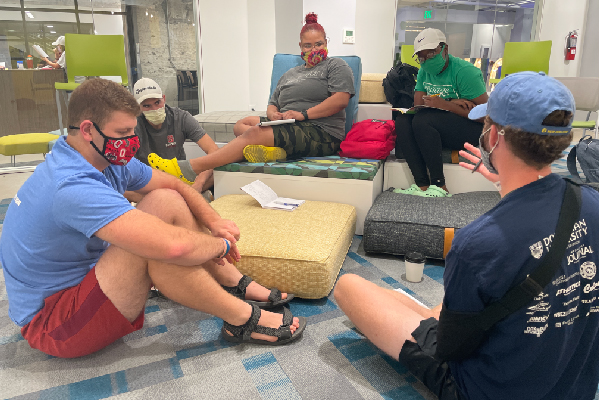News

University awards micro-credentials demonstrating skills employers want
The University of Dayton now awards micro-credentials demonstrating students have the top skills employers say they want: critical thinking, communication, creative problem solving, resilience and more.
“Employers value a college degree, but on top of that, they want to know prospective hires can learn from their own successes and failures, focus on solutions instead of problems, question common assumptions and a whole host of other skills,” said Brian LaDuca, executive director of UD’s Institute of Applied Creativity for Transformation (IACT). “The micro-credential program focuses on these creative skills and allows students to demonstrate they have them through performance-based assessments founded in workplace scenarios. This emerging form of credentialing is more immediate and more accessible to all students of all backgrounds and will help them stand out when they compete for summer jobs, internships, co-ops and ultimately their careers.”
The accredited micro-credential badges, created by the national nonprofit Education Design Lab, can be applied to students’ resumes and LinkedIn profiles. Micro-credentials are gaining importance as fewer employers say they screen candidates by GPA and more focus on attributes like teamwork, according to the National Association of Colleges and Employers.
“It sets my resume apart from other candidates in my field,” said mechanical engineering student Kathleen Gawelek, who has earned micro-credentials in creative problem solving, collaboration and critical thinking.
Gawelek said the credentials increase the flexibility of her degree, and will help in her career to reach her goal of designing manufacturing methods to decrease plastic and clothing waste. “As an engineer who also aspires to integrate other fields into my work, such as sustainability, art, business and design, I am constantly pushing the boundaries of my field in order to solve the world's more complex problems.”
The micro-credentials also are useful to train new employees and retrain existing ones in the workforce, said Bryan Stevens, chief of Workforce Strategy & Data Intelligence for the Air Force Research Laboratory. AFRL’s LEGACY program, which inspires young people to pursue STEM (science, technology, engineering and math) fields, partnered with UD to provide micro-credential training to high school students.
“The students are able to come into the workforce ready to collaborate and be resilient in any environment,” he said.
The training also helps LEGACY achieve its goal of investing and building the nation’s future diverse STEM workforce talent to support the national security strategy, said Dan Andrews, LEGACY program director.
“The partnership with UD via micro-credentials has provided my program another avenue to provide students in the LEGACY program the ability to learn more about themselves earlier in life while receiving micro-credentials that can be placed on their resume for future employment,” he said.
